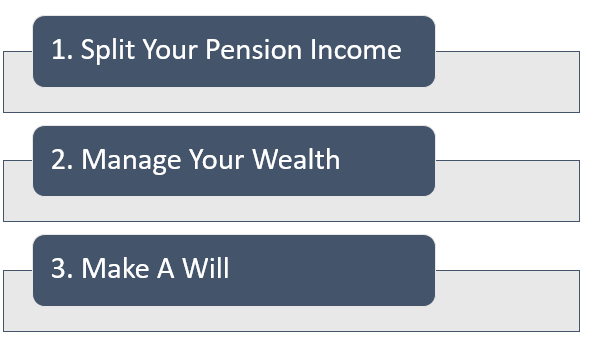Smart Money Moves for Seniors: Essential Financial Tips for Aging Gracefully

In your golden period, you simply cannot afford to waste money. Instead, you should strive hard to save money so that you can keep enjoying your best phase. Below is a list of some of the best financial tips for seniors that you can follow to efficiently manage your money.


Best Money Management Tips
1. Split Your Pension Income
In all those later years, you might not be willing to pay a lot of taxes to the government. After all, you are not working now, and all you have is your pension and maybe interest income.
If you are above 65 years old, then you can certainly split up to 50% of your pension income with your spouse or common-law partner. It will allow you to lower your taxable income as the quantum of the pension split will be added to the taxable income of your partner.
Pension income splitting is an effective tax management tool using which you can make up to 50% of your pension income tax-free. However, you can split only the “eligible pension income”, which is the aggregate of the following amounts:
- The taxable annuity payments received from:
- Superannuation
- Pensions funds
- Retirement plans
- Annuity payments and incomes from R. R. S. P (Registered Retirement Savings Plan)
- Amounts distributed from Retirement Compensation Arrangement that are qualified
- Income from D. P. S. P (Deferred Profit-Sharing Plan)
- Regular annuities received from I. A. A. C (Income Averaging Annuity Contracts)
- Retirement benefits and all the retroactive lumpsum payments received from R. P. P (Registered Pension Plans)
- Income received from R. R. I. F (Registered Retirement Income Fund)
- Benefits received from E. B. P (Employee Benefit Plans)
- Any pension received from foreign, such as US Social Security
You are not allowed to split pension income that is beyond this ambit. Below is a list of “ineligible pension income” that is specifically specified by the government:
- All the payments that are associated with old age security
- Payments received from:
- Canada pension plan
- Quebec pension plan
- Any pension income that is received from foreign and is tax-free in Canada
- Income received from I. R. A(Individual Retirement Account) run by the United States
- Line 11500 amounts received from R. R. I. F (Registered Retirement Income Fund) and transferred to:
- Another R. R. S. P (Registered Retirement Savings Plan)
- Another R. R. I. F (Registered Retirement Income Fund)
- Another annuity plan
2. Manage Your Wealth
Dealing with probate fees is cumbersome. It can be expensive, and is based on the total value of your estate. The higher your estate value, the higher will be the probate fees. In Ontario, it is calculated based on the following slab rate:
| Slab | Total Value of Estate | Probate Fees | |
| I | Up to $50,000 | $5 for every $1000 | |
| II | Above $50,000 | $15 for every $1000 | |
To reduce the burden of probate fees, it is necessary that you manage and try to reduce the overall value of your estate. You can do this by following the below methods:
| S. No. | Methods | Description |
| 1. | You Can Name Your Beneficiaries | If you own a Life Insurance policy, then you can name the beneficiaries. The amount will be credited to the bank accounts of your beneficiaries and will not be included in your estate value |
| 2. | You Can Hold Your Assets in Cash or Bearer Certificates | You can hand over the bearer certificates to your legal heirs, and they can cash them directly into their accounts. This way, such assets do not form a part of your estate value |
| 3. | You Can Accumulate Funds in Registered Savings Plan | The funds accumulated or contributions made in the registered savings plans, such as RRSP, RRIF, and TFSA, are not required to be probated. Any income remaining in these accounts upon your demise is not included while calculating the value of your estate |
| 4. | You Can Gift Your Property While You Are Alive | When you gift your property while you are alive, such a gifted asset, is not included in your estate value |
| 5. | You Can Create A Trust Fund | You can set up a “Trust Fund” and can transfer the assets to it after your demise: a) This trust will become the sole owner of the assets held by it and Will distribute them to the rightful owners’ Such assets will not become a part of your estate value |
3. Make A Will
It is the most ignored part of human life. The seniors pay no heed to make a will, and ultimately their family suffers due to their omission.
In the absence of a will:
- The court appoints your “closest relative” as the executor. He or she oversees the entire distribution process and has the final say. There is a possibility that the court-appointed executor might not distribute your assets impartially.
- Your family, spouse, and kids will not be able to control your estate directly, as most of it will be frozen
- There is a possibility of chaos, confusion, and fights among your legal heirs.
Hence, it is always the best option to write a “will” while you are alive. It will help your beneficiaries in getting what they deserve, and they will also be saved from lengthy, complex, and costly legal processes.



